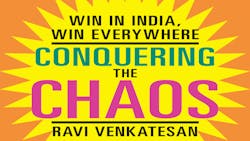Win in India, Win Everywhere
Cummins India secured more than 60% of market share in both the diesel engines and diesel generating sets sectors in India, developing a business that now represents 10% of the its parent company's global revenues.
How did they achieve this?
The answer to this question is a study in how a manufacturing company can be successful in a market that is described by Ravi Venkatesan, former chairman of Cummins India, as consisting of "massive corruption, scandals, weak kleptocratic political leadership, divisive politics and stalled reforms."
Venkatesan, the former chairman of Microsoft India, authored a book, Conquering the Chaos, to educate companies as to why India matters in a company's strategic plan and how to succeed in this difficult climate.
Talking with other multinationals leaders who have succeeded in India, including GE, Dell, Nokia, Honeywell, Volvo, Bosch, Unilever, Venkatesan concludes that "India's strategic importance is not only because it's a large market: but more importantly it is a petri dish for developing products, business models, talent, and operating models that will help companies succeed in a host of challenging markets."
"You have to learn to win in India to be able to win everywhere else," Venkatesan explains. "It is a good place for multinationals to learn to deal with corruption, volatility, chaos, poor infrastructure and the problems they will face in other emerging markets."
The determining factor of success in India is the level of commitment a company is willing to make. Venkatesan points out that Cummins was willing to hang on for seven to eight years in order to make money in this market. "It takes vision and courage," he told IndustryWeek. "A company has to play the short term, medium term and long term all at once."
Waiting until the chaos of the marketplace that is India to resolve itself is not a smart strategy as early competitors will already be entrenched. Venekatesan provides the example of the American automakers who were very late to the game in India and now only have 1% to 2% of the market while Suzuki, Hyundai, Mahindra & Mahindra and Tata Motors have 90%.
One reason American companies find it difficult to enter the Indian market is the issue of corruption. "You can't get nervous about corruption, you need to develop a culture on how to deal with it," Venekatesan explains.
And learning how to deal with the unique challenges in India includes forming an operating model that strikes a balance between local responsiveness and global standardization. "The ability to respond quickly to customer opportunities, market shifts and competitors' moves is essential."
Vankatesan recommends that companies develop a governance model that moves from control to trust and accountability. "It should be a conscious endeavor to maximize the number of decisions within the country and have explicit agreement on which few decisions need consultation or approval. Reporting locally to a senior management with bottom-line accountability for the India business facilitates agility, ownership and accountability."
With these systems in place India becomes an innovation lab. And innovation is necessary when selling to the fast-growing middle market is hard. "To win in India requires an offering that provides 70% of the value at 30% of the price. This requires product innovation and may necessitate a different business model."
But the lessons learned in creating this new model can be applicable to the company's entire global footprint. "Winning in India becomes important because it's a catalyst for the development of powerful new capabilities that are critical for competing worldwide. Offense is the best defense."
